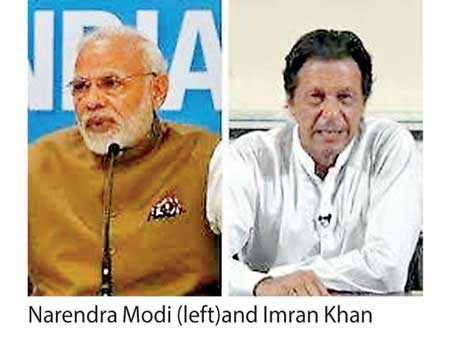Wednesday Feb 18, 2026
Wednesday Feb 18, 2026
Wednesday, 1 August 2018 00:00 - - {{hitsCtrl.values.hits}}
 Islamabad (Reuters): Indian Prime Minister Narendra Modi called Imran Khan on Monday to congratulate him on his party’s victory in the Pakistan general election, with both men discussing regional peace.
Islamabad (Reuters): Indian Prime Minister Narendra Modi called Imran Khan on Monday to congratulate him on his party’s victory in the Pakistan general election, with both men discussing regional peace.
It was their first call since Khan’s Pakistan Tehreek-e-Insaf (PTI) emerged victorious from last week’s vote that has been marred by claims of pre-election rigging and irregularities on the day.
Relations between the nuclear-armed rivals have frayed in the last couple of years, with direct talks stalled amid diplomatic rows and military firing across the Line of Control frontier that divides the disputed region of Kashmir.
Khan, widely seen as Pakistan’s prime minister-in-waiting, is now courting independent candidates and minor parties to form a coalition government in a nation that has fought three wars with India.
In the phone call, Modi “reiterated his vision of peace and development in the entire neighbourhood”, according to a statement by India’s Ministry of External Affairs.
Khan declared in his victory speech that he wanted to resolve the long-standing territorial dispute over Kashmir, saying “if India comes and takes one step towards us, we will take two”.
Khan’s media team said he had told Modi it was vital both countries focus on pulling millions out of poverty.
The PTI said Khan had also told Modi that issues between the two nations must be resolved through talks. “Wars can breed tragedies instead of facilitating resolution of conflicts,” he said, according to a PTI statement.
“Prime Minister (Modi) expressed hope that democracy will take deeper roots in Pakistan,” the Indian ministry said in a brief statement.
European Union observers say there was an uneven playing field during the election as major obstacles were put in the way of a rival party that was led by jailed former premier Nawaz Sharif. The United States has also expressed concern about what it calls electoral “flaws”.
Khan has offered to investigate all claims of irregularities, and promised to build a new Pakistan with an Islamic welfare state that would seek to elevate those mired in poverty.
Some analysts and commentators have said Pakistan’s democracy has been weakened by meddling by the armed forces. Both Khan and the military deny colluding with each other.
Majority-Muslim Pakistan has criticised India in recent years about what it calls New Delhi’s heavy-handed tactics in Kashmir, as well as violence suffered by the Muslim-minority groups in India at the hands of Hindu extremists.
India blames Pakistan for stoking the revolt in Kashmir and the Modi government has refused talks unless Islamabad acts against militant groups operating from its soil against India.
India and Pakistan have fought three wars since independence from Britain in 1947, two of them over Kashmir, which they both claim in full but rule in part.
In its first response to Khan’s election, the Indian foreign office said it hoped Pakistan’s new government would work for a terror-free South Asia.